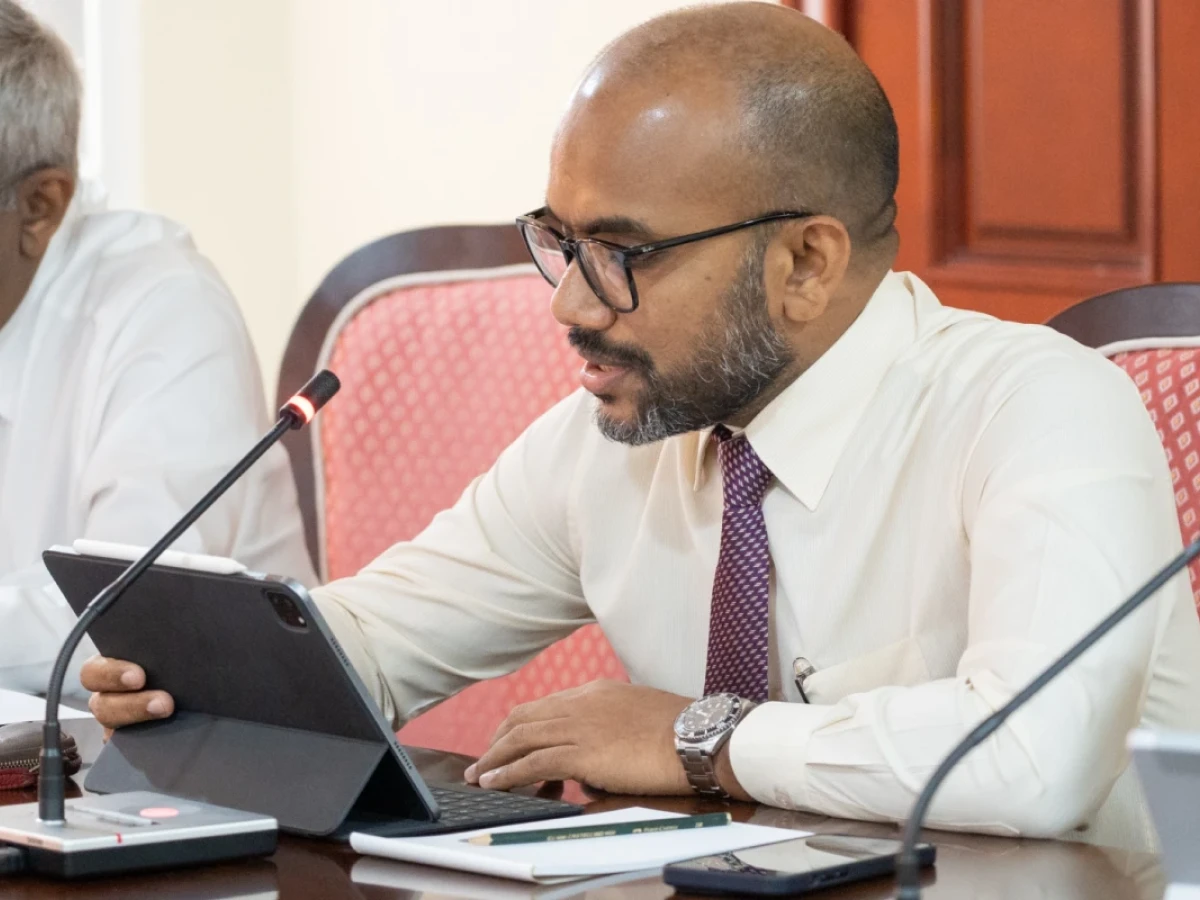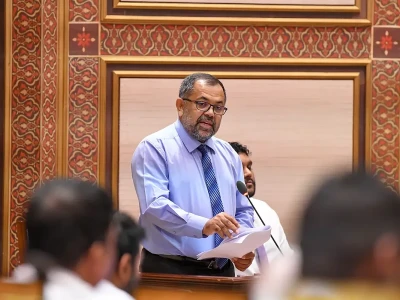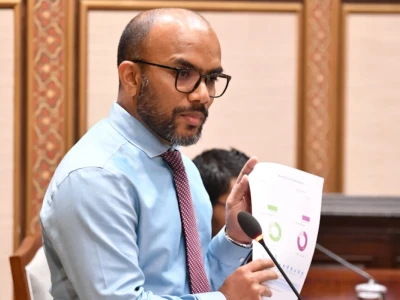
Govt touts $150-300m annual debt repayment capacity
Chief Financial Budget Officer Ahmed Saruvash said one of the biggest challenges facing the country's economy right now is rising inflation and fuel prices.
Top Stories
By
Ahmed Naif
Maldives has the capacity to pay USD 150-300 million (MVR 2.3 - 4.6 billion) in debt to foreign lenders in a year and the risks are small even as interest rates are being raised in the global financial markets, the finance ministry told the parliament on Wednesday.
At a meeting convened by the parliament's Public Finance Committee, the ministry's Debt Management Expert Abdulla Hassan said that the Maldives does not have difficulty in repaying foreign debt in the short term. He said the country has the ability to fulfil debt worth USD 150-300 million a year.
"That's a manageable amount," he said.
He, however, said the country will have to pay huge amounts of debt after next year:
-
In 2025 and 2026, Maldives have to pay USD 100-500 million (MVR 1.5-7.7 billion) in one go
-
The country needs to be prepared for the time and find ways to make the financial market resilient to repay the debts
Abdulla said the finance ministry has enough experience and capability to go to the financial markets and manage debt through a liquidity management activity. Testifying to this, he said that the USD 250 million (MVR 3.9 billion) 'Sunny Side Bond' that the Maldives had to pay in 2022 was managed in a way that was friendly to the market due to the efforts of the finance ministry staff.
According to him, tourism came to a standstill due to Covid-19 and the slowdown in the economy led to an increase of Sunny Side Bond yields rising to 26%. As a result, the country could get loans only at 26%t interest, he said.
Abdulla said the Maldives had to recover the bond dues within a year, but even in that difficult situation, the finance ministry managed the debt in a market friendly manner and brought down the yield on Maldivian bonds to 10.5%.
This, he pointed out, resulted in an additional USD 7 million in annual debt. The burden was taken to revive the economy, he said.
"Even the Sri Lankan bonds performed better than us at that time. But they had to restructure them today. At that time, we were in a similar situation. What happened to Sri Lanka was the impact on the reserves when huge payments had to be made in one go. But we strategised and managed," Abdulla said.
The biggest challenge for the country at the moment is refinance risk, Abdulla said. However, with past experience, the finance ministry has the capacity to take that risk, he said.
"We are already working on it. We are confident that we will be able to manage the market without restructuring it," Abdulla said.
Interest hike will not have an impact
Hulhudhoo MP Ilyas Labeeb asked the finance ministry officials whether the rising interest rates in the global financial market could worsen the country's debt situation.
Replying to a question, Abdulla said the average interest rate on the country's total debt stood at 4.2%.
-
92% of the country's debt is at fixed interest rates
-
The other 8% of the debt is in interest that changes with the market price
-
Interest is rising at 4%
Even if the interest rate increases at 5% in the worst-case scenario, the country's debt is expected to increase by MVR 80 million per annum, Abdulla said.
"The high interest rate is insignificant for us. The biggest risk for the country is the risk of refinance," Abdulla said.
He said that despite the refinance risk, the interest on the country's debt could be reduced from 4.2% to 3.2%. Abdulla also noted that there was room for the Maldives to reduce refinance risk.
'Bond conditions are good'
The country's bonds are still in good shape in the market, Abdulla said. He pointed out:
-
Maldivian bonds can be bought at USD 86, while bonds are sold at USD 85
-
Country's bond falls to 78 cents per dollar amid Covid crisis
-
Bond yield is 16%
-
This is a very good measure as compared to other countries like the Maldives
Finance Minister Ibrahim Ameer told the committee that the current policy of the Maldives is to be active in the financial market. This has improved relations with investors and made it easier for the country to raise funds at the needy hours, he said.
He, however, said "speculations" that the country is bankrupt by those holding some responsible positions affect the state of the country in the financial market.
Noting that the country is "not in danger" financially or economically, Ameer said statistics show how the economy is perfoming well. He said:
-
Post-Covid economy growth at 42%; it will grow at 7.6% this year
-
The 2022 budget had projected inflation at 5.4%; and it was at 3.9%
-
Both the government and the private sector are adding more jobs
-
Debt, which was at 150% of GDP last year, has now come down to 96%
-
With guarantees given by the state, the total debt stood at 113% of GDP
-
Revenues are also better than expected; 30% more in tax revenue that estimates
'Unlikely to go for an economic crisis'
Chief Financial Budget Officer Ahmed Saruvash said one of the biggest challenges facing the country's economy right now is the risk of rising fuel and commodity prices. There is a possibility of higher subsidy costs if fuel prices go up, he said.
Saruvash said that while the global fear of inflation at the moment and financial markets are challenging, central banks are now predicting that they can avoid an economic crisis. He said financial markets are also expected to stabilise this year with the measures being taken by global central banks.




